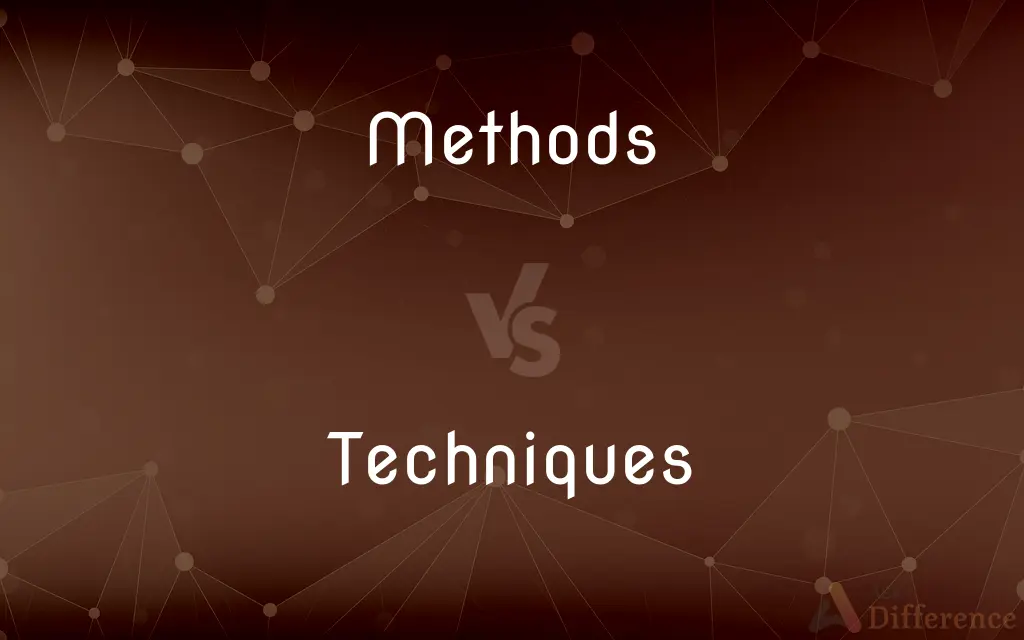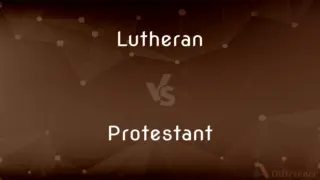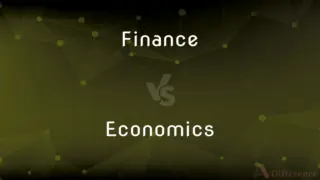Methods vs. Techniques — What's the Difference?
By Maham Liaqat & Fiza Rafique — Updated on March 13, 2024
Methods are comprehensive approaches or strategies to achieve a goal, while techniques are specific procedures or skills within those methods.

Difference Between Methods and Techniques
Table of Contents
ADVERTISEMENT
Key Differences
Methods encompass the overall plan or strategy used to achieve a particular objective. They provide a structured framework that guides the process of reaching a goal, whether it's in research, teaching, problem-solving, or any other domain. Techniques, however, refer to the specific procedures or skills applied within the broader methodological framework. They are the actual actions or steps taken to effectively implement a method. For example, within the experimental method, techniques might involve specific data collection procedures, statistical analyses, or laboratory protocols.
Methods are often chosen based on the nature of the goal, the subject matter, and the available resources. They set the stage for the application of various techniques. For example, in education, a teacher might choose a collaborative learning method to enhance student engagement and understanding. Within this method, various techniques such as group discussions, peer reviews, or role-playing exercises can be used to achieve the desired learning outcomes.
Techniques often require a certain level of skill or expertise and can be adapted or modified to suit the specific requirements of a method or to address emerging challenges. While a method provides the theoretical underpinning for an approach, techniques are about the practical application of this theory in real-world scenarios.
The relationship between methods and techniques is inherently hierarchical and symbiotic. Methods provide the overarching framework that outlines the general approach to achieving an objective, while techniques are the tools employed within this framework to carry out specific tasks or activities. Understanding this distinction is crucial for effective planning, execution, and analysis in any field of work or study.
Comparison Chart
Definition
A structured approach or strategy to achieve a goal.
Specific procedures or skills applied within a method.
ADVERTISEMENT
Scope
Broad, outlining the overall plan.
Narrow, focusing on particular actions or steps.
Purpose
To provide a framework for achieving an objective.
To execute specific parts of a method effectively.
Flexibility
Methods are more fixed, though they can be adapted to different situations.
Techniques can be more easily modified or tailored.
Skill Level
Understanding the theory and rationale behind methods.
Mastery or proficiency in performing specific actions.
Compare with Definitions
Methods
A systematic way to approach a problem or task.
The scientific method is a systematic approach to understanding natural phenomena.
Techniques
Skills or actions taken to accomplish a component of a method.
Brush strokes are techniques used in painting to create different textures.
Methods
An overarching strategy or framework used in research or teaching.
The case study method involves in-depth investigations to explore complex issues.
Techniques
Specific procedures or steps employed within a method.
The chromatography technique is used in chemistry to separate mixtures.
Methods
A structured approach to collecting data or conducting analysis.
In sociology, qualitative methods are used to understand human behavior and societies.
Techniques
Detailed processes or operations within a broader methodological approach.
In cooking, sautéing is a technique for quickly cooking food in a small amount of fat.
Methods
A general plan of action aimed at achieving specific outcomes.
Agile is a project management method that emphasizes iterative development and customer feedback.
Techniques
The art or skill of executing particular tasks.
Persuasive techniques in writing include the use of rhetorical questions and emotional appeals.
Methods
A set of guidelines or principles guiding a process or activity.
Meditation methods involve various principles to achieve mental clarity and relaxation.
Techniques
Tools or strategies employed to achieve specific tasks within a method.
In photography, long exposure is a technique for capturing images in low light conditions.
Methods
A means or manner of procedure, especially a regular and systematic way of accomplishing something
A simple method for making a pie crust.
Mediation as a method of solving disputes. See Usage Note at methodology.
Techniques
The basic method for making or doing something, such as an artistic work or scientific procedure
Learned the techniques involved in painting murals.
Methods
Orderly arrangement of parts or steps to accomplish an end
Random efforts that lack method.
Techniques
Skill or command in a particular activity
A pianist with superb technique.
Methods
The procedures and techniques characteristic of a particular discipline or field of knowledge
This field course gives an overview of archaeological method.
Techniques
Plural of technique
Methods
Method A technique of acting in which the actor recalls emotions and reactions from past experience and uses them in identifying with and individualizing the character being portrayed.
Methods
Plural of method
Common Curiosities
How do methods and techniques differ in research?
In research, methods refer to the overall approach, such as experimental or observational, while techniques are the specific procedures used, like surveys or interviews.
Can techniques be used across different methods?
Yes, certain techniques may be applicable across various methods, but their application might vary depending on the context.
What defines a technique?
A technique is a specific procedure or skill used within a broader methodological framework to accomplish particular tasks.
Do methods change more frequently than techniques?
Typically, methods are more stable, providing a consistent framework, whereas techniques may evolve or adapt more rapidly to new insights or technologies.
What is a method?
A method is a structured approach or strategy designed to achieve a specific goal or objective.
Why is it important to distinguish between methods and techniques?
Understanding the distinction helps in planning and executing strategies more effectively, ensuring that the appropriate techniques are applied within the context of a chosen method.
How are new methods and techniques developed?
New methods and techniques are developed through research, innovation, and adaptation to new challenges and technologies.
Can a single method include multiple techniques?
Yes, a single method can encompass a variety of techniques to address different aspects of the method’s application.
How are methods and techniques related?
Methods and techniques are related in a hierarchical manner, where methods provide the overall plan and techniques are the specific actions taken within this plan.
Are techniques less important than methods?
Techniques are not less important; they are essential for the practical application of methods and often determine the effectiveness of the method in achieving its goals.
Is expertise in techniques sufficient for successful execution of a method?
Expertise in techniques is crucial, but a thorough understanding of the method and its underlying principles is also essential for success.
How do methods and techniques contribute to problem-solving?
Methods offer a structured approach to problem-solving, while techniques provide the practical means to implement the method and achieve solutions.
Can the effectiveness of a method be independent of the techniques used?
The effectiveness of a method is often closely linked to the appropriateness and execution of the techniques used within it.
Can the choice of techniques impact the outcome of a method?
Yes, the choice and execution of techniques can significantly impact the effectiveness and outcomes of a method.
What role do methods and techniques play in teaching and learning?
In teaching and learning, methods guide the educational approach, while techniques are the specific teaching strategies or activities used to engage students.
Share Your Discovery

Previous Comparison
Lutheran vs. Protestant
Next Comparison
Finance vs. EconomicsAuthor Spotlight
Written by
Maham LiaqatCo-written by
Fiza RafiqueFiza Rafique is a skilled content writer at AskDifference.com, where she meticulously refines and enhances written pieces. Drawing from her vast editorial expertise, Fiza ensures clarity, accuracy, and precision in every article. Passionate about language, she continually seeks to elevate the quality of content for readers worldwide.















































